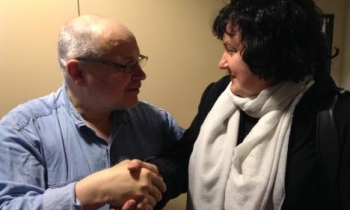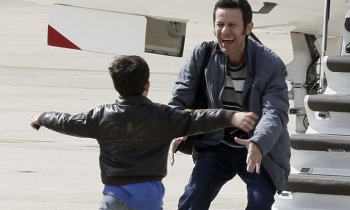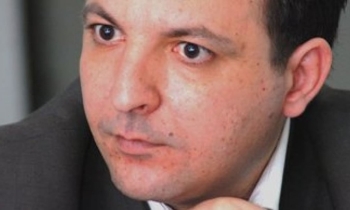Despite widespread acknowledgement that Ukraine’s media have become much freer since President Viktor Yushchenko came to power over a year ago, the United States plans to continue spending millions of dollars financing the development of independent journalism in the country.
U.S. Ambassador to Ukraine John Herbst told a conference in Kyiv April 10 that the U.S. will allocate $2.3 million to support the growth of objective sources of news in Ukraine in 2006.
Herbst credited the authorities who came to power on the crest of Ukraine’s 2004 Orange Revolution, noting that journalists are no longer being killed, and law-enforcement agencies aren’t harassing them anymore.
The U.S. will continue funding the development of Internet sites and special reports on economic and social subjects, Herbst said.
The United States Agency for International Development alone has earmarked around $2.4 million for its two major media development programs in fiscal year 2005, according to Assia Ivantcheva, deputy director for USAID’s office of democracy and government. Ivantcheva said the budget for fiscal year 2006 would be about the same.
The Kyiv branch of Internews, a U.S.-based non-governmental organization, and Ukraine’s Center for Ukrainian Reform Education, have received multi-million-dollar grants from USAID over several years.
Internews is mostly involved in providing things like training for journalists, media lawyers and managers, plus legal aid and legislative assistance.
This training and assistance is implemented by Ukrainian partner organizations like Kyiv NGO Telekritika.
Telekritika, which offers a website and monthly journal, analyzes media and conducts sociological surveys, radio shows and roundtables on media issues.
Supported primarily by Internews, as well as the U.S.-based National Endowment for Democracy, Telekritika receives an average of $100,000 a year in funding, said Natalya Ligacheva, who heads the NGO.
Internews also provides some grants for equipment purchases, production of radio and TV programs and the kind of monitoring and research work mentioned by Ambassador Herbst.
Ivantcheva said that grants, or direct financial assistance to media-related projects conducted by Ukrainian NGOs, are allocated on a competitive basis through the so-called Open Media Fund, which is jointly sponsored and implemented by the International Renaissance Foundation a part of the Soros Foundations Network, founded and chaired by billionaire and philanthropist George Soros and USAID-funded Internews.
The U.S. Embassy in Kyiv also awards grants directly, which are approved by a board.
"Most of these grants run from three to eight thousand dollars," said Brent Byers, press attache at the U.S. Embassy.
Byers said the Embassy allocated around $750,000 in 2005 and plans to allocate as much this year. The money is used to finance websites for Ukrainian newspapers, the occasional purchases of office equipment and special projects.
"But we don’t tell them what to write," said Byers.
"The only restriction is that we don’t support state media," he added. "The whole idea is to help Ukrainian media become independent."
USAID’s main focus is development of regional media, said Ivantcheva. Indirectly or directly, the agency supports 20-30 local radio and TV broadcasters and 15-16 local newspapers.
The Center for Ukrainian Reform Education, USAID’s second major recipient of funding, concentrates on public education and press events through its 25 regional centers.
Ukrainian media also receive support from Europe.
"The EU no doubt is the biggest donor to Ukraine and its support has been significantly raised since 2003," said Helene Chraye, head of operations for the Delegation of the European Commission to Ukraine.
According to the delegation, between 2003 and 2004, the EC approved three grants totaling over 325,000 euros and one service project for 1.2 million euros to support independent media in Ukraine.
Since 2005, the EC has sponsored a 2-million-euro project called "Development of Media Skills". Currently, the EC is conducting an ongoing tender for grants under the European Initiative for Democracy and Human Rights, an EU program that promotes human rights and democracies in developing countries, to support freedom of expression, with grants of between 300,000 and 1 million euros.
"However, the point is not which donor organization is spending more or less money in a specific area or on specific modalities, like grants or loans," said Chraye. "We are developing strong coordination mechanisms with other donors, not only through meetings, but by preparing joint projects."









